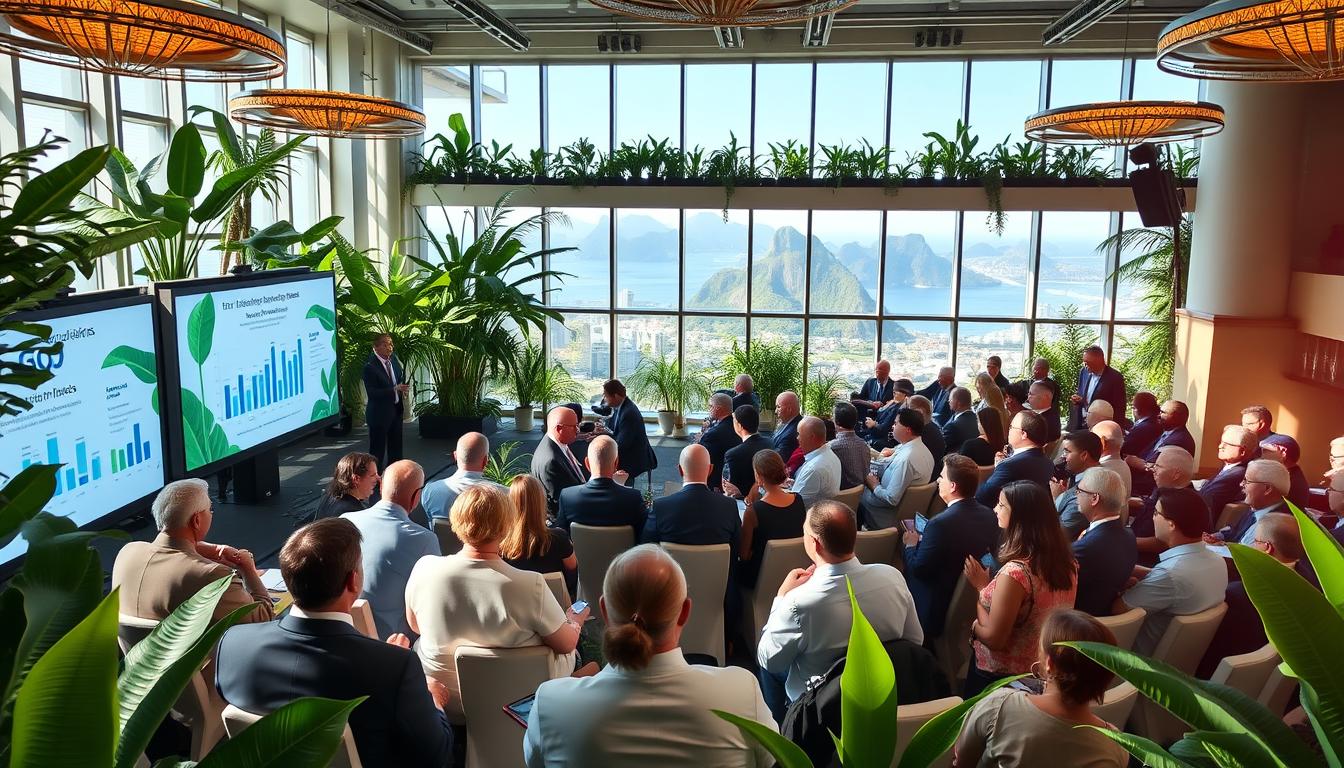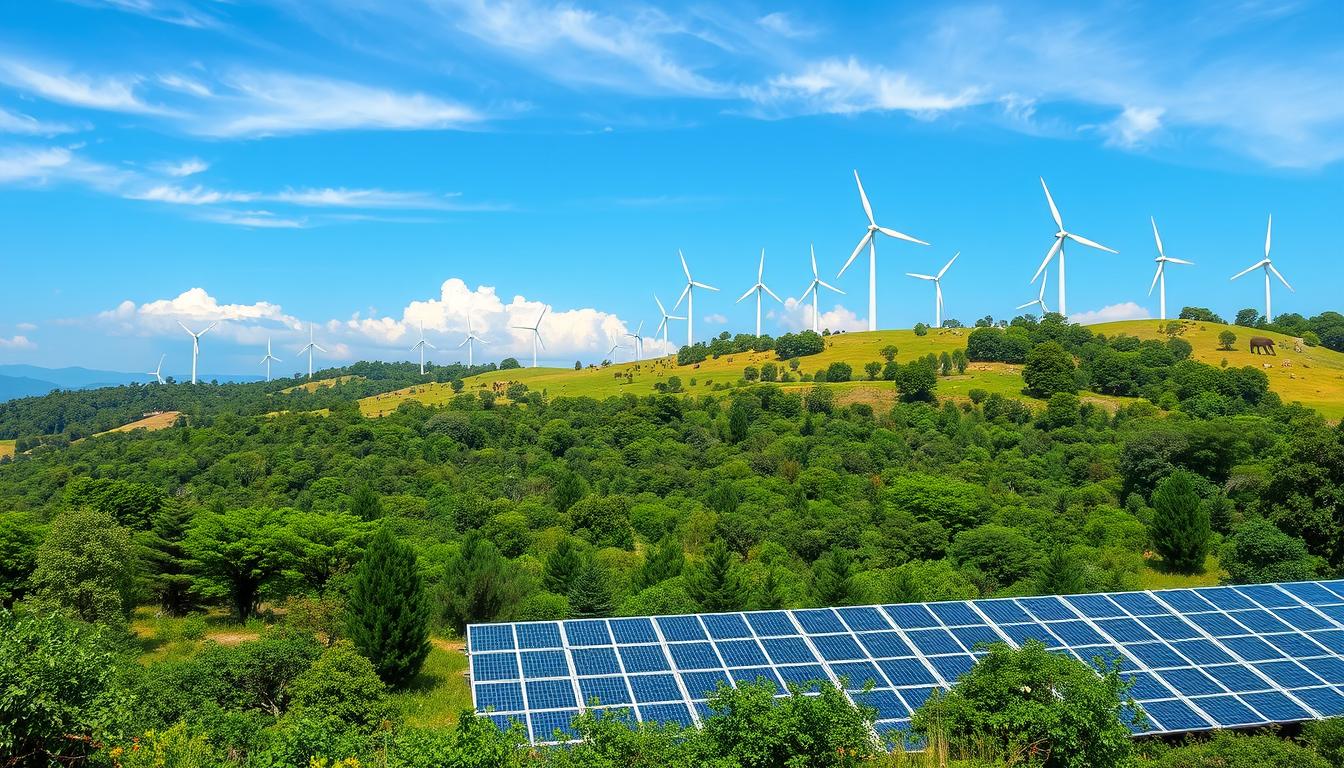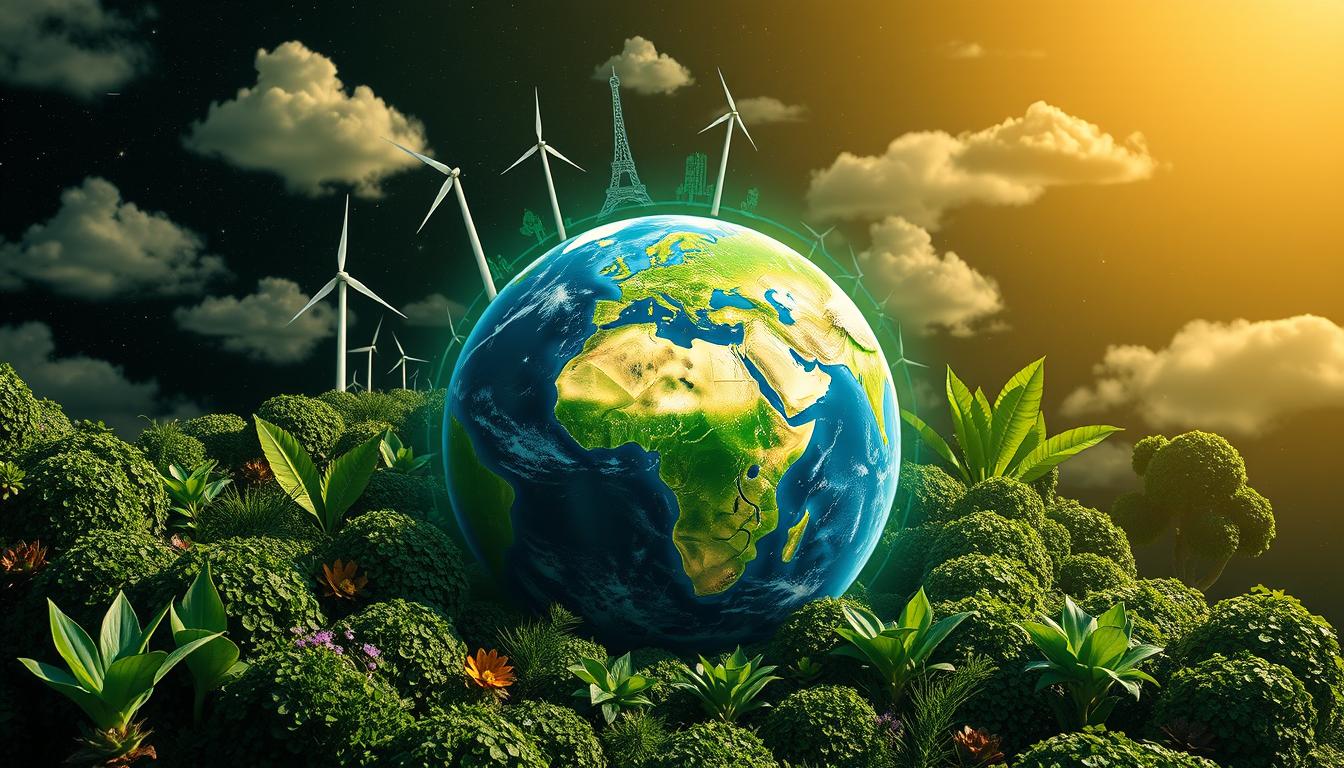G20 Rio Talks: Climate Finance Breakthrough Unveiled
World leaders met in Rio de Janeiro for the G20 summit. Everyone was excited and watching the talks closely. They hoped for a big change in how we deal with climate finance.
UN Secretary-General Antonio Guterres said it was crucial for G20 countries to fight the climate crisis. He urged them to take action.
The summit happened at the same time as the COP29 climate conference in Azerbaijan. This showed how urgent it was to find a solution for climate finance. The G20 countries, with 85% of the world’s economy and 75% of emissions, had a big role to play in a sustainable future.
Key Takeaways
- The G20 summit in Rio de Janeiro focused on crucial issues like climate finance, poverty, hunger, and global institution reform.
- G20 countries, responsible for 85% of the world’s economy and 75% of greenhouse gas emissions, were expected to lead the charge in climate action.
- The summit’s timing coincided with the COP29 climate conference in Azerbaijan, highlighting the need for a breakthrough in climate finance negotiations.
- Developing nations demanded equitable financing structures and greater climate finance from developed countries.
- Calls for stronger actions to control methane emissions and achieve the Paris Agreement’s 1.5°C target were a key focus.
G20 talks in Rio reach breakthrough on climate finance, sources say
The G20 summit in Rio de Janeiro made a big step forward on climate finance. Sources say there’s a new commitment to fight global warming. This will help the world’s economies.
Diplomatic Tensions over Global Warming
The summit had tough talks between rich and poor countries. The rich ones, who cause most pollution, were asked to do more. Poor countries want them to help more with money and actions.
UN Climate Negotiations at COP29
The COP29 talks in Azerbaijan are very important. UN climate chief Simon Stiell wants G20 leaders to act fast on climate money. He wants more help for poor countries and better banks for a green economy.
Key Stakeholders and Their Positions
There are many views in the talks. European countries want more countries to help, including China and Middle Eastern oil producers. Poor countries say rich ones must do more to fix the climate crisis.
The COP30 summit in Brazil next year is crucial. The G20 needs to agree on at least $1 trillion for climate finance. This is urgent because we’re far from the Paris Agreement’s goal.
“The G20 talks in Rio have the potential to be a game-changer in the global fight against climate change. But it will require bold and decisive action from world leaders to turn this breakthrough into tangible progress.”
The world is in a big hurry to solve the climate crisis. What happens at the G20 summit and COP29 will affect our planet’s future.
Understanding G20’s Role in Global Climate Finance
The Group of 20 (G20) nations are key players in funding climate action and sustainable development. They lead the way in funding through multilateral development banks. This makes their role vital in tackling global climate issues and helping developing countries.
G20 nations are responsible for over three-quarters of global greenhouse gas emissions. This shows their big role in fighting climate change. They have 85% of the world’s economy, showing their power to make big changes.
Developing countries face big challenges in getting the funds they need. The UN Secretary-General wants more money from Multilateral Development Banks. This is to help these countries use green financing for sustainable development.
| Statistic | Value |
|---|---|
| G20 nations’ contribution to global emissions | Over 80% |
| G20 nations’ share of the world’s economy | 85% |
| Recommended new goal for climate financing | At least $1 trillion |
The world needs to keep global warming under 1.5 degrees Celsius. The G20’s role in setting climate finance goals is more important than ever. The next G20 summit will focus on climate finance for developing countries.
The UN urges G20 leaders to enhance grants for developing nations and push reforms in multilateral development banks.
The G20 nations have the power to unlock green financing for sustainable development. Their leadership and commitment to climate action are crucial. They will shape the global response to this environmental crisis.
Biden’s Final G20 Summit: Legacy and Climate Commitments
President Joe Biden is at his last G20 summit. He’s the first U.S. president to visit the Amazon rainforest. At the Museu da Amazonia in Manaus, Brazil, he signs a proclamation for “International Conservation Day”. This shows his team’s strong push for renewable energy investments, climate change negotiations, and emissions reduction targets.
Biden says his climate legislation achievements will stand, even with political ups and downs. He talks about the U.S. giving $500 million to the Amazon Fund. They’ve already given $50 million and plan to give another $50 million during this visit.
Historic Amazon Rainforest Visit
Biden’s visit to the Amazon is a big deal. He’s the first U.S. president to see this important place. His tour at the Museu da Amazonia shows his team’s big commitment to saving the environment.
International Conservation Day Proclamation
Biden makes November 17 “International Conservation Day”. This move shows his team’s big push for climate change negotiations and saving our planet.
Climate Legislation Achievements
Biden is strong on his emissions reduction targets and keeping his team’s climate legislation achievements. His Amazon visit shows his team’s strong commitment to the environment and fighting climate change.
Mobilizing Trillion-Dollar Climate Finance Goals
The world needs to tackle climate change fast. The COP29 summit aims to set a big goal for climate funding. This goal is to be at least $1 trillion a year, up from current levels.
Developing countries say they need more money to cut emissions and act on climate. Climate campaigner Mohamed Adow has been to nine COPs. He fears a breakdown or walkout at COP29 if funding talks fail.
The EU, small island states, the African Union, G77, and China are key players at COP29. Their talks will be crucial for success. But, there’s a big gap between what they offer and what’s needed.
| Climate Finance Demands | Current Commitments |
|---|---|
| Developing countries want around $1 trillion a year for climate action. | Rich countries promised to raise $100 billion yearly by 2020. They met this goal in 2022. |
| Developing countries need trillions for climate action. Estimates are between $5 trillion to $6.8 trillion by 2030. They also want up to $7.8 trillion for the same period. | At COP29, developing countries like the G77 plus China group asked for $1.3 trillion yearly. This is for emissions cuts, adaptation, and loss and damage. |
The G20 countries, being the biggest economies and emitters, are key to COP29’s success. They must meet global financial commitments. The focus will be on green finance and climate change mitigation efforts.
Critical Partnership Between G20 and COP29 Initiatives
The success of COP29 and COP30 in Brazil depends on climate finance. G20 leaders in Rio will shape COP29 talks in Azerbaijan. Their partnership is key for climate finance mechanisms and sustainable development goals.
Azerbaijan Talks Development
The G-77/China bloc wants $1.3 trillion yearly in climate finance. But, most climate finance is in loans, a big worry for many. COP30 in Brazil next year will be shaped by Baku’s decisions.
Climate Finance Mechanisms
G20 countries, with 80% of emissions and 85% of the economy, are crucial. South Africa will lead the G20 in 2025, pushing for green financing mechanisms. Yet, the $100 billion annual climate finance pledge is still unmet.
The European Union leads in climate financing through multilateral funds. Chinese President Xi Jinping wants G20 to boost funding and support for the Global South.
“Tripling renewables globally until 2030 could lead to a reduction of 10 billion tonnes of CO2 emissions.”
The G20 and COP partnership is vital for reaching the sustainable development goals and Paris Agreement. The world waits for Rio and Baku’s decisions, crucial for our planet’s future.
Brazil’s Leadership in Environmental Policy
Brazil, led by President Luiz Inacio Lula da Silva, is a key player in fighting climate change. At the G20 summit, they showed strong support for the Global South’s climate goals. Lula’s team is pushing big economies to act fast and take responsibility for the environment.
Lula started a “Global Alliance against Hunger and Poverty” at the G20. This shows how climate change and poverty are linked. It’s important to solve these problems together.
Lula wants billionaires to pay more taxes. He believes the rich should help fund a renewable energy future. This supports carbon emission reduction targets and Brazil’s goal for sustainable development.
“We cannot separate the fight against poverty from the fight against climate change. They are two sides of the same coin.”
– President Luiz Inacio Lula da Silva
Brazil is leading the way in environmental policy. They are key to the COP30 summit’s success. With their commitment to the Paris Agreement and sustainable development, Brazil will play a big role in fighting climate change.
- G20 countries account for 85% of the world’s economy
- G20 countries are responsible for more than three-quarters of greenhouse gas emissions worldwide
- Economists suggest that the new goal for financing directed to developing nations should be at least US$1 trillion
- Discussions at the G20 summit in Rio stalled over expanding the base of contributors to climate finance to include richer developing nations like China and major Middle Eastern oil producers
- Brazil’s COP30 strategy includes the “Mission 1.5” initiative to limit global warming to 1.5 degrees Celsius, as the current national targets would cause temperatures to rise by at least 2.6 degrees Celsius
- Developing countries argue that they can only raise their emissions reduction targets if rich nations, considered the main culprits for climate change, finance the efforts.
Global South Perspective on Climate Finance Distribution
The world is facing a big challenge with climate change. The way climate finance is shared is a big issue, especially between the Global North and South. Countries like Brazil don’t want to give a lot of money to global climate funds.
Developing Nations’ Demands
Developing nations say it’s the Global North’s job to fix climate change. They point out that the North has made more pollution. So, they think the North should give more money to help the South adapt and fight climate change.
Equitable Financing Structures
The South wants fair ways to share money for climate change. They say it’s not just about giving aid. It’s about sharing the cost based on who has done more harm. This way, everyone can work together to fix the problem.
This section shows the South’s view on sharing climate money. It helps us understand the complex talks on climate change. It shows we need a fair way to tackle the global climate crisis.
“The Global South’s demand for equitable climate finance is not a matter of charity, but of justice and shared responsibility. The historical responsibility of the Global North cannot be ignored if we are to achieve meaningful progress in the fight against climate change.”
- The Global South argues that the responsibility for climate action should be proportional to historical emissions and levels of development.
- Developing nations demand increased climate finance from wealthy countries to support mitigation and adaptation efforts in the Global South.
- Equitable financing structures are crucial to ensure a fair distribution of the burden and enable sustainable development in the face of the climate crisis.
Mission 1.5: Keeping Paris Agreement Targets Alive
Global leaders meet at the COP29 climate conference in Baku, Azerbaijan. They focus on Brazil’s “Mission 1.5” plan. This plan aims to get the G20 to cut greenhouse gas emissions. It wants to keep global warming below 1.5 degrees Celsius, as set by the Paris Agreement.
Current plans would let temperatures rise by at least 2.6 degrees Celsius. This would be very bad for our planet. The Mission 1.5 plan urges the world’s biggest economies to work faster on reducing emissions. This is to fight global warming mitigation more effectively.
“Achieving the Paris Agreement’s 1.5-degree Celsius goal is the defining challenge of our time. We must act with unprecedented urgency and coordination to secure a sustainable future for all,” said Brazilian President Luiz Inácio Lula da Silva.
Before COP29, Brazil is pushing the G20 to set emissions reduction targets that match the Paris Agreement. Success in this mission is key for the planet’s future. It also matters for the UN climate talks’ credibility.
The G20 countries are responsible for over three-quarters of global greenhouse gas emissions. Their support for Mission 1.5 will decide if we can meet the Paris Agreement goals. This will help avoid the worst of climate change’s effects.
Multilateral Development Banks Reform Strategy
The world needs green finance and sustainable development now more than ever. The G20 talks have brought a big change for multilateral development banks (MDBs). These banks help a lot with international cooperation and funding for green projects.
The new plan for MDBs is to help the world switch to a greener economy. The main points of the strategy are:
- More money for projects: The goal is to increase MDBs’ funds by 50%. This will help meet the demand for green projects.
- Less waste in operations: The plan is to cut down on costs by 20%. This will make more money available for projects.
- Speed up project funding: The aim is to spend 30% more on projects in the next five years. This will help get funds to where they’re needed faster.
- Make things happen quicker: The strategy wants to cut down project approval times by 15%. This will help get projects started sooner.
These changes are key to getting the money needed for big climate goals. The Paris Agreement and COP30 in Brazil are big targets. They aim to keep global warming under 1.5 degrees Celsius.
| Metric | Current Scenario | Post-Reform Targets |
|---|---|---|
| MDB Portfolio Size | $485 billion | $728 billion (50% increase) |
| Administrative Costs | N/A | 20% reduction |
| Disbursement Rate | N/A | 30% increase over 5 years |
| Project Approval Times | N/A | 15% reduction |
The reformed MDBs will be very important. They will help get the green finance needed for sustainable development worldwide. They will also help countries work together more on climate change.
Economic Impact and Implementation Timeline
The G20 summit in Rio de Janeiro has ended. Negotiators have agreed on a draft statement. It talks about the economic impact and when to start the climate finance plans.
The G20 countries have come up with economic strategies. They know a lot of money is needed to fight climate change. Experts say at least $1 trillion should come from developed countries, banks, and the private sector to help developing countries.
This money is meant to help communities adapt to climate change. It will also help them move to cleaner energy sources.
The summit also set a timeline for these plans. The leaders want to make sure these actions happen fast. They plan to work together to make these changes happen.
This plan is to keep the fight against climate change going. It also helps in achieving sustainable development goals.
FAQ
What were the key outcomes of the G20 talks in Rio de Janeiro?
The G20 talks in Rio de Janeiro focused on climate finance and poverty. They also talked about hunger and global institution reform. The summit highlighted the need for a breakthrough in climate finance negotiations.
G20 countries account for 85% of the world’s economy. They also account for 75% of greenhouse gas emissions.
What were the diplomatic tensions surrounding global warming at the G20 summit?
Diplomatic tensions over global warming were a big deal at the G20 summit. Disagreements between wealthy countries and developing nations on climate finance contributions were a big issue.
How did the COP29 climate negotiations in Azerbaijan influence the G20 talks?
The G20 summit coincided with COP29 in Azerbaijan. The success of both was seen as crucial for advancing climate finance mechanisms. The UN climate chief urged G20 leaders to act on climate finance.
He suggested boosting grants for developing nations and reforming multilateral development banks.
What was the role of the G20 in global climate finance?
G20 countries are the largest contributors to multilateral development banks steering climate finance. They play a crucial role in mobilizing funds for climate action and sustainable development.
They make the group’s economic and environmental influence essential for addressing global climate challenges. They also support developing nations.
What were the key highlights of President Biden’s participation in the G20 summit?
President Joe Biden attended his last G20 summit as a lame-duck president. He became the first U.S. president to tour the Amazon rainforest.
He signed a proclamation designating November 17 as “International Conservation Day.” Biden also insisted that his climate record will survive another Trump mandate.
He highlighted his administration’s climate legislation achievements.
What were the goals for climate finance at the COP29 negotiations?
COP29 aimed to set a new goal for climate financing. They wanted to raise at least $1 trillion for developing nations.
Economists suggested this amount. Developing countries argued they could only raise their emissions reduction targets if rich nations provided adequate funding.
How was the partnership between the G20 and COP initiatives crucial for advancing climate finance?
The success of COP29 and the upcoming COP30 in Brazil hinged on a breakthrough in climate finance. The G20 leaders’ decisions in Rio were expected to influence COP29 negotiations in Azerbaijan.
The partnership between the two initiatives was crucial for advancing climate finance mechanisms. It was also key for achieving sustainable development goals.
What was Brazil’s role and perspective at the G20 summit?
Brazilian President Luiz Inacio Lula da Silva championed Global South issues and the fight against climate change. Brazil launched a “Global Alliance against Hunger and Poverty” at the G20 summit.
He pushed for higher taxes on billionaires, emphasizing the importance of addressing poverty alongside climate issues. Brazil’s COP30 strategy centered on the “Mission 1.5” initiative.
This initiative aims to keep the Paris Agreement target of limiting global warming to 1.5 degrees Celsius alive.
How did developing nations approach the climate finance discussions at the G20 summit?
Developing nations, including Brazil, resisted pressure from wealthy countries to contribute to global climate finance. They argued for more equitable financing structures that acknowledged historical responsibilities for emissions.
The Global South perspective emphasized the need for balanced climate action. It should address both environmental and socioeconomic concerns.
What strategies were discussed for reforming multilateral development banks to support climate finance?
G20 discussions included strategies for reforming multilateral development banks. They aimed to better support climate finance and sustainable development.
The reform aimed to increase the banks’ capacity to fund climate projects. It also aimed to support developing nations in their transition to low-carbon economies.
What were the expected outcomes regarding the economic impact and implementation timeline of the proposed climate finance measures?
The G20 summit was expected to outline the economic impact of proposed climate finance measures. It was also expected to provide an implementation timeline.
Negotiators from all G20 members agreed on a draft final statement. The economic strategies discussed aimed to balance climate action with poverty reduction and sustainable development.
Source Links
- Methane from tropical wetlands is surging, threatening climate plans
- G20 leaders to grapple with climate, taxes, Trump comeback
- Methane from tropical wetlands is surging, threatening climate plans
- G20 talks in Rio reach breakthrough on climate finance, sources say
- G20 talks in Rio reach breakthrough on climate finance: Sources
- G20 talks in Rio reach breakthrough on climate finance, sources say
- Raising the roof: Building resilience through conserving historic homes in the Philippines
- World looks to G20 summit in Rio de Janeiro for breakthrough in climate talks
- Starmer to meet Chinese President Xi at G20 summit
- From the Amazon rainforest, Biden declares nobody can reverse US progress on clean energy
- Cop29: Spectre of failure overhangs Baku as talks near collapse
- COP29: Countries still miles apart on climate finance at tense UN summit | NEWS | Reccessary
- Vaishnavi Rana
- COP29 week one ends in deadlock as divisions stall climate action progress
- UN chief urges G20 ‘leadership’ on stalled climate talks
- G20 talks in Rio reach breakthrough on climate finance, sources say
- World looks to G20 in Rio for breakthrough in climate talks
- Talks – Oxford Talks
- Politics
- Dozens killed, missing in Israeli strike on devastated north Gaza
- What is COP29 and how will Trump’s election affect the climate talks?
- World looks to G20 in Rio for breakthrough in climate talks
- Biden allows Ukraine to use US arms to strike inside Russia
- World looks to G20 in Rio for breakthrough in climate talks
- World looks to G20 in Rio for breakthrough in climate talks
- Biden touts climate legacy in landmark Amazon visit
- Global Issues : social, political, economic and environmental issues that affect us all





